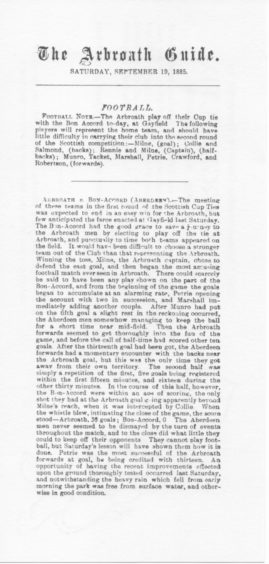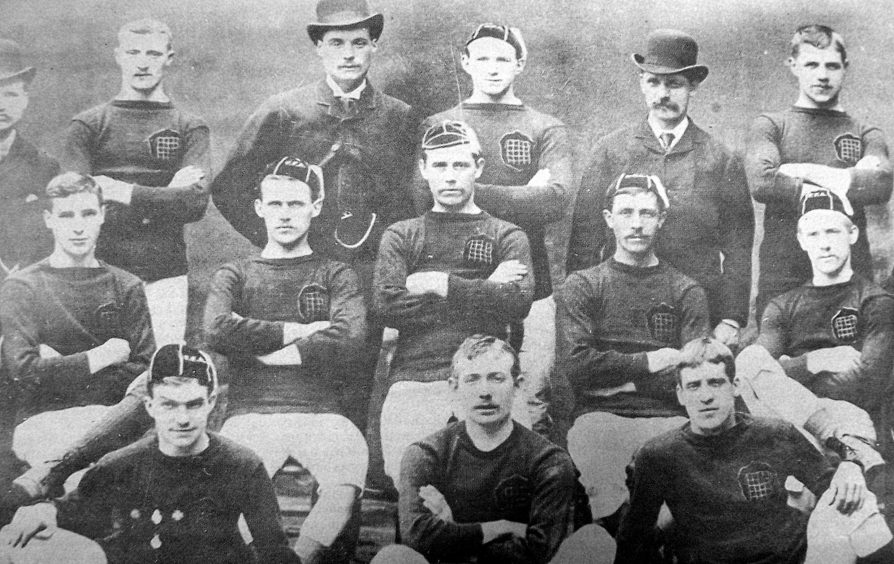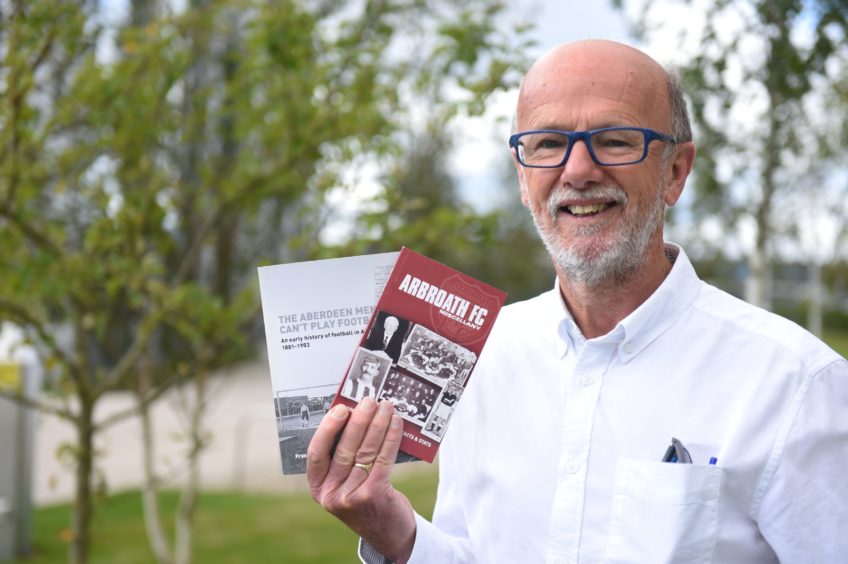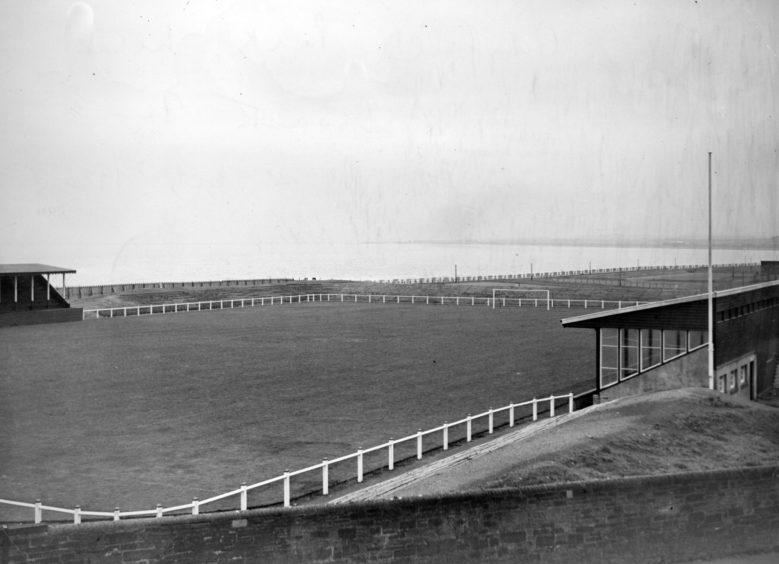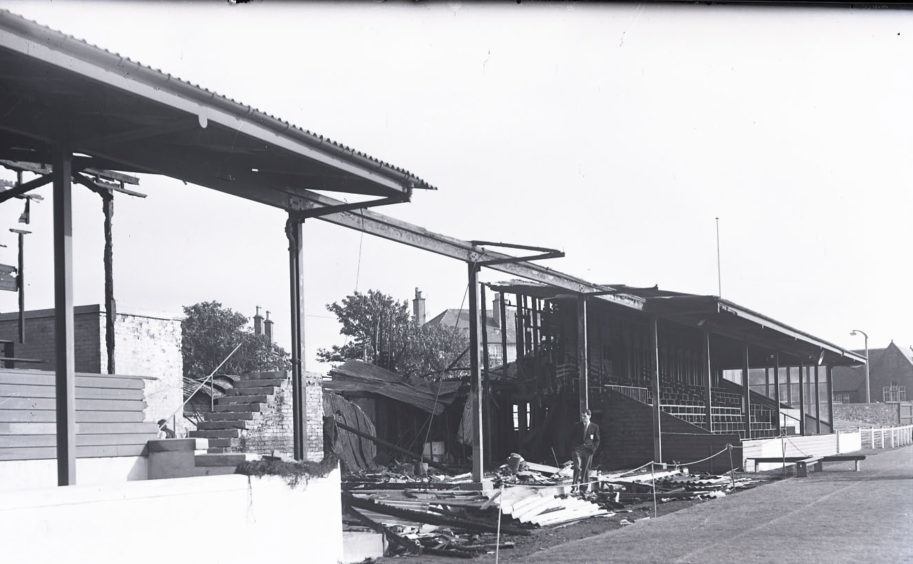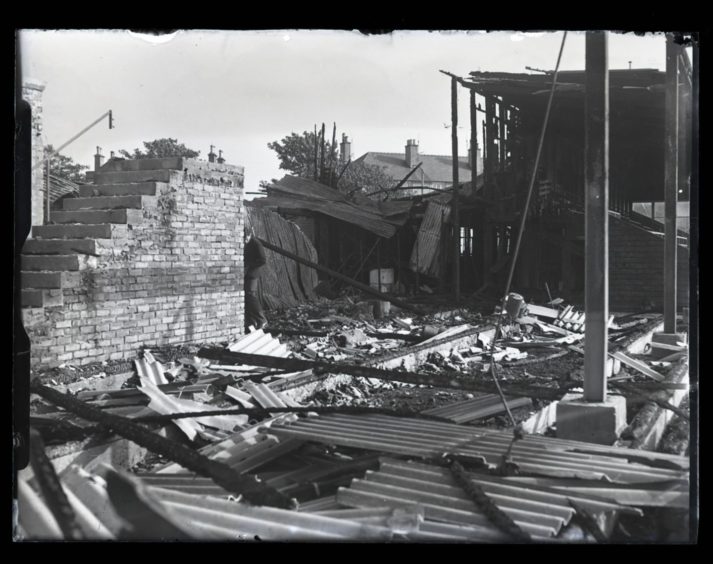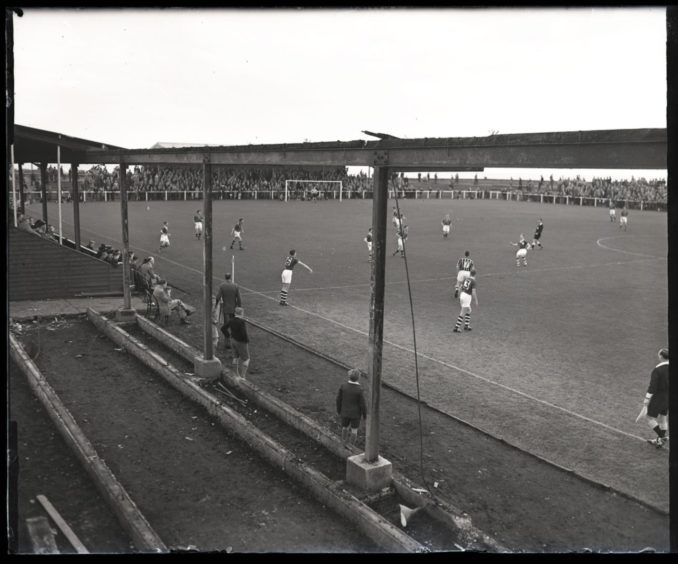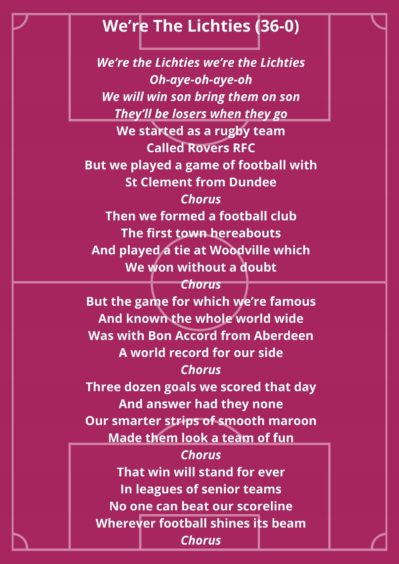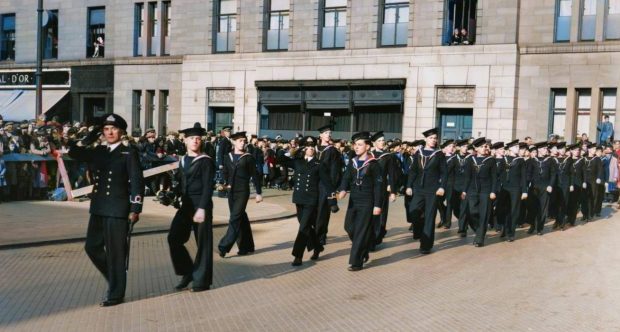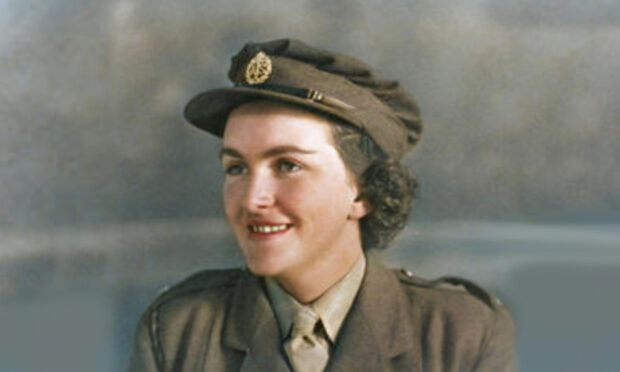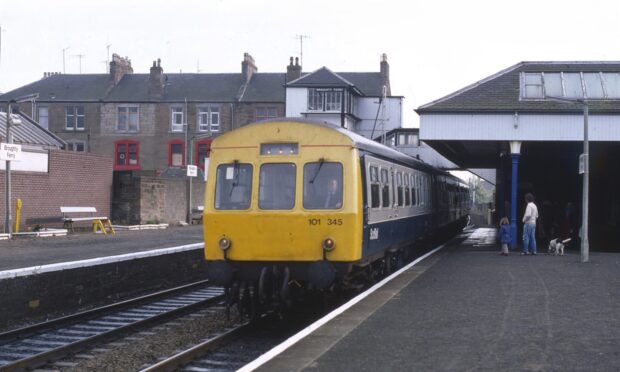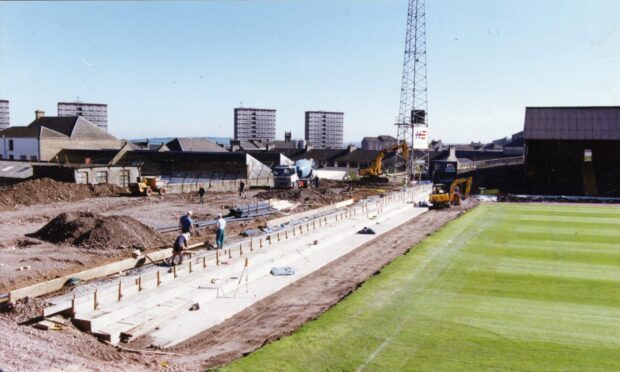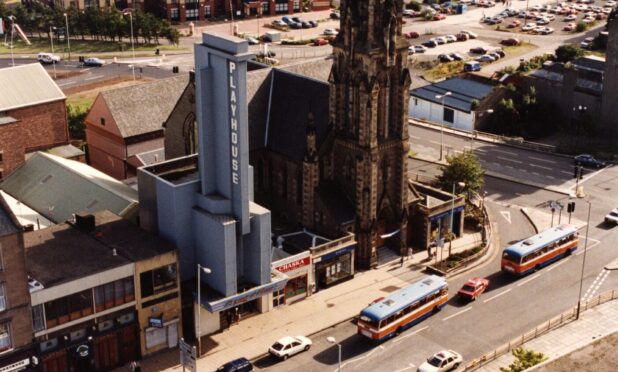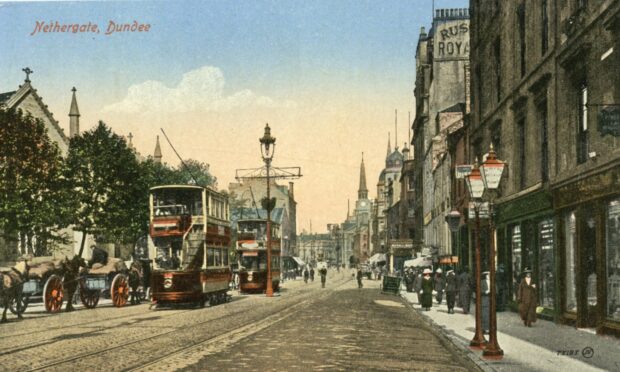It was the highest-scoring day in Scottish Cup history which put Arbroath on the world football map.
The Lichties were 15-0 up at half-time during their world record 36-0 win against Bon Accord in a Scottish Cup tie which happened 135 years ago this weekend.
On the same day, Dundee Harp were recording a result they thought had given them a world beating scoreline after dispatching another Aberdeen team, Aberdeen Rovers, 35-0.
That scoreline could also have been more.
At the end of the game, the referee told Harp’s committee that it had been difficult for him to keep count of the goals, but he thought it was 37.
The Harp committee admitted they had recorded just 35 goals and the referee accepted their version.
Between them, Arbroath and Dundee Harp scored over 100 goals in the Scottish Cup that season.
And they never even reached the fifth round.
The reporters at the Arbroath game had a hard time keeping up with the score – and it was lucky that referee Dave Stormont kept an accurate record of the event.
The final tally could have been much more as many years later he admitted they could actually have won 43-0 after he chalked off seven goals for offside.
Stormont said: “My only regret was that I chalked off seven goals, for while they may have looked doubtful from an offside point of view, so quickly did the maroons carry the ball from midfield, and so close and rapid was their passing, that it was very doubtful whether they could be offside”.
John Petrie was just 18 at the time and his 13 goals in a single game remains a record for British senior football.
Reports from the time claim that Bon Accord arrived for the biggest game in their short existence with no form of official playing kit, let alone footwear.
To make matters worse they turned up with only nine players and had to secure two volunteers from the 600 crowd.
Goalkeeper Jim Milne senior was reported to have sheltered under a spectator’s umbrella during the match and neither handled nor kicked the ball.
By contrast, the Bon Accord goalkeeper, Andrew Lornie, a gas fitter by trade, is said to have retired shortly after that fateful day.
Lornie’s usual position was right-half and he started the game with no goalkeeping experience.
Bill Collie and Tom Salmond were the Arbroath full-backs, while Hen Rennie, Jim Milne junior and Dyken Bruce made up the half-back line.
Petrie played on the right-wing, while Johnny Tackett, Jim Marshall, David Crawford and Jim Buick were the other forwards.
The Scottish Athletic Journal at the time wrote: “The leather was landed between the posts 41 times, but five of the times were disallowed.
“Here and there, enthusiasts would be seen, scoring sheet and pencil in hand, taking note of the goals as one would score runs at a cricket match.”
Arbroath FC historian Fraser Clyne said: “When teenager John Petrie made his way to Gayfield on a wet and miserable day 130 years ago this weekend, he could never have imagined that he and his Arbroath team-mates were about to carve out a remarkable piece of footballing history.
“The Lichties trounced the hapless Aberdeen side Bon Accord 36-0 in a Scottish Cup tie with Petrie grabbing 13 of the goals.
“The scoreline and his personal tally remain record figures revered even now.
“But after delving into the history books, some doubts remain as to whether the scoreline may have been higher – and, more intriguingly – whether another result that same day in Dundee, might even have bettered Arbroath’s achievement.
“Irishman Tom O’Kane treated his Harp clubmates to a slap-up tripe and potato supper in the Dundee Arms public house to celebrate a victory which, he believed, would secure the East Dock Street team a place in Scottish footballing history.
“Earlier in the day – Saturday, September 12, 1885 – O’Kane had played his part in Harp’s 35-0 slaying of Aberdeen Rovers in the first round of the Scottish Cup.
“The referee had noted 37 goals, but Harp’s secretary suggested a miscount must have occurred as he had recorded ‘only’ 35.
“The match official, acknowledging it was difficult for him to keep accurate details during such a deluge of goals, accepted the lower tally and wired the official score of 35-0 to SFA headquarters.
“It mattered little to O’Kane at the time.
“The Arbroath-based full-back was certain that 35-0 was still a record-breaking result.
“Even in those early days of organised football, when high scoring games were not uncommon, this was a margin of victory which, surely, would never be matched.
“O’Kane, who played for Arbroath before joining his Irish compatriots at Harp, even persuaded the Dundee club’s officials to agitate his former Red Lichties colleagues by sending a telegram to Gayfield boasting of his team’s magnificent achievement.
“The Harp players and officials were not to know, however, that Arbroath had, on that same afternoon, actually gone one better against another unfortunate Aberdeen side.
“On receiving the Harp telegram, Arbroath officials took great delight in sending a reply boasting of the Angus side’s superior achievement.
“It was only when O’Kane arrived back in Arbroath on the late Saturday evening train that he discovered the truth. Locals were quick to tell him that the Arbroath result was no joke and Harp’s record-breaking claim was about to be lost.
“Even if Harp’s original 37-0 scoreline had been allowed to stand, there is evidence to suggest that Arbroath may have been able to claim an even higher winning margin.
“The man who refereed the Bon Accord game, Dave Stormont, admitted in a newspaper article many years later that he disallowed seven Arbroath goals for little good reason.”
The Lichties played 42 games that season, winning 26 and losing 11.
They scored 178 goals and conceded 81.
The Arbroath 36-0 score was equalled in an Estonian Cup match between Infonet FC and Virtsu Jalgpalliklubi on 13 June 2015.
After 13 goals in the first half, Infonet’s managing director approached the team and motivated them by promising to buy them three cakes if they scored at least 33 goals.
However, only 83 fans watched the capital side strike 23 times in the second-half as everyone but the goalkeeper got on the scoresheet.
The largest victory record is held by Pelileo Sporting Club who beat Indi Native in the Ecuadorian Third Division in front of just 200 supporters in 2016, with striker Ronny Medina scoring 18 goals.
Pelileo scored 24 goals in the first half and 20 in the second.
But it was not ratified as a Guinness World Record as it did not occur at a high enough sporting level.
The photographs of the club’s greatest day went up in smoke in 1958
All the photographic records of Arbroath’s great teams from the past – including the club’s 36-0 heroes – were lost when the main stand at Gayfield went up in flames in 1958.
The fire destroyed the west and central portions of the main grandstand at Gayfield with damage estimated at between £6,000 and £7,000.
The home and away dressing rooms, treatment room, referee room, secretary’s office, treasurer’s office, board room and press box were all ruined along with playing kit, training kit, boots and footballs.
Among the objects believed to have gone up in smoke was the Presidents Chair, donated to the club in 1938 by cabinet maker Alexander Neilson as a token of his lifelong support.
The fire broke out in the early hours of the morning following a match against Partick Thistle.
A fox terrier named Susan raised the alarm after scratching at her owner’s bed.
The woman, who lived at Tutties Neuk across from Gayfield, saw the stand well alight and phoned 999.
Fire crews from Arbroath and Carnoustie managed to prevent the blaze from spreading.
So fierce and high were the flames the playing field was clearly illuminated as if floodlit.
Timbers and beams cracked noisily and there were great showers of sparks.
People living a quarter of a mile away were wakened by the noise.
When daylight came the following morning the destroyed part of the stand was described as a “forlorn sight”.
Among the embers and twisted girders lay charred jerseys, boots and shinpads, mute testimony of the fierceness of the blaze.
The community spirit shone through in the aftermath with offers of help including from one schoolboy who sent the club his pocket money.
Written in a neat hand, the letter read: “Please find enclosed my pocket money which I am sending you hoping to will help to build another stand.
“I am a Maroons supporter. I travel to Gayfield every home match and know what your team means to Arbroath.
“Wishing you and your team good luck.”
A postal order for two shillings was attached to the letter from Wilson Petrie of Montrose.
The letter was described by secretary Mr W E Forrester as “a wonderful spontaneous gesture”.
The stand had been in existence since 1925 when the reconstruction of Gayfield was completed.
The next game against Berwick Rangers went ahead despite the setback and the players changed at Arbroath Lads Club’s pavilion which was quite near the ground.
36-0 win immortalised in song by popular local band Slipway
Arbroath’s world record win was immortalised in song in 2017 by local band Slipway.
The album was written by retired journalist Ian Lamb, whose first new song, The Bell Rock Light, lit the creative flame to pen a collection of songs about the Angus town.
Mr Lamb plays guitar in Slipway alongside vocalist Alan Mowatt and accordionist and keyboard player Tony Simpson.
They were joined by brothers-in-law Jim Tosh and Jim Fairweather on the chorus for the 36-0 track.
The album has been raising money for local charities and Arbroath Smokies and the Round O of Arbroath Abbey also feature on the songbook.
